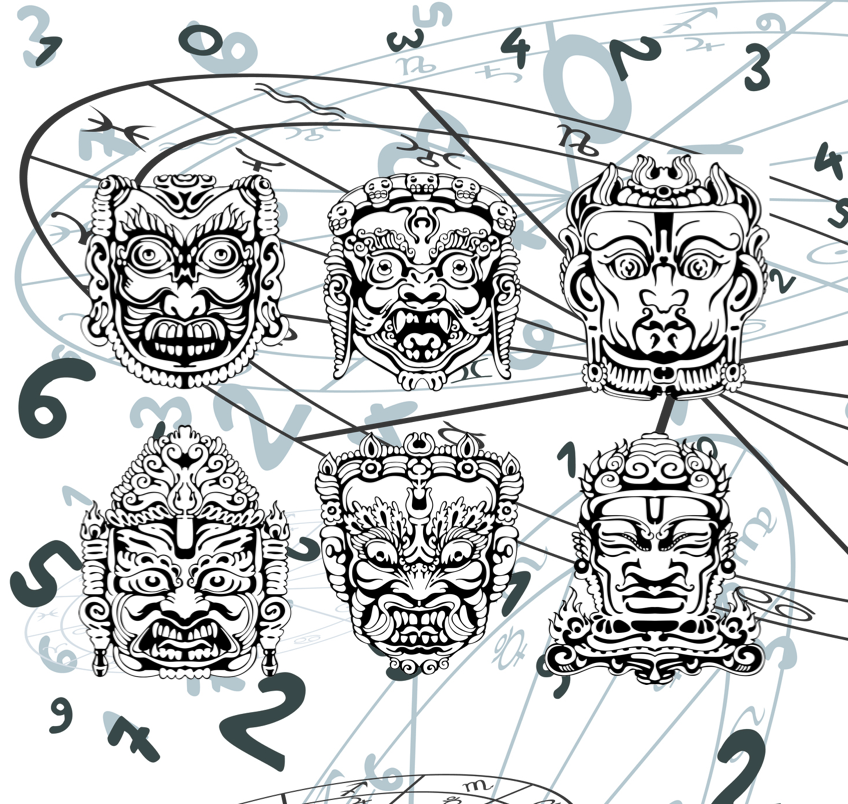Numerology is the practice of analyzing numbers and their energies and is thousands of years old. It’s no surprise, then, that some of the major world religions incorporate numerology into their studies, reaching more with numerology than ever thought possible. So let’s look at Indian numerology. How is numerology applied in Hinduism, the world’s third-largest major religion?
Background on Hinduism
One of the oldest religions on the planet, Hinduism is practiced by nearly 15% of the world’s population – approximately 1.15 billion people. Hinduism originated on the Indian subcontinent and makes up nearly 80% of India’s religious population, though it now has adherents around the world. Otherwise known as Hindu dharma, after the eternal law of the religion, Hinduism can be traced back to the second millennium BC.
Generally speaking, adherents of the Hindu religion see Hinduism as a way of life and not just a religion. They believe that truth comes in many forms and depends on the circumstances of the believer. A long, continuous tradition and many ideas, practices, and experiences form a large network of diversity within the religion.
Numerology Basics
Generally speaking, numerology is the study of numbers. However, it is necessary to dive much deeper than the surface level when it comes to discussing numerology, because numerology isn’t only about mathematics. Instead, numerology involves the understanding of each number as a different source of energy. These building blocks of energy comprise how we understand ourselves, individuals around us, and the universe at large.
Individually, each number can be analyzed to isolate particular traits, behaviors, and qualities. When taken together, patterns of numbers can be used to understand the way it all fits together, a more in-depth, overall picture of a person and their motivations. However, where do we get these numbers?
Perhaps you’ve noticed a particular number, appearing again and again in some way, shape or form, throughout your life. Maybe you’ve always had a lucky number, or a number that’s held significance for you for one reason or another. Still, other significant numbers are found in your birth date or associated with the letters of your birth name. In short, significant numbers can be found anywhere.
Numerology and Hinduism
Given the nature of the Hindu religion, it is not difficult to see how practices such as numerology came to be intertwined with the faith. Perhaps more so than other religions, Hinduism uses numerology to describe people and even their motivations. Overall, three different types of numbers are considered important to Hindus
Psychic Number
The Psychic number is said to define an individual’s character and reveal the way a person looks at him or herself. It is said to influence personality, daily interactions, and explain the actions of a person. Arguably the most fundamental number, it is derived from the day of the month on which an individual was born.
People born on the 1st through the 9th have already arrived at their psychic number. For two-digit numbers, simply add the digits. For example, a person born the 27th of the month has a Psychic number of 2+7=9.
Destiny Number
A Destiny number, on the other hand, is said to reveal how the world views a particular person. It is related to a person’s Sankara, or vibration patterns related to karma or past deeds. It is said that throughout life, people become more and more like their destiny number as they learn lessons, particularly in the late 30s and 40s.
A Destiny number is calculated by adding up the day, month, and year of birth, continuing to add until a single digit is reached. For example, a Destiny number for a birth date of 1-12-2001 would be accomplished by adding 1+1+2+2+0+0+1=7.
Name Number
A name number is said to influence relationships with other people. A person can have different name numbers based on the different names people call them, or the names they choose to go by. A name number is calculated using the sound frequencies of the original pronunciation of a name, which correspond to various numbers.
Hindu Number Meanings
Each number has a certain meaning in Hinduism, and individuals with psychic, destiny or name numbers corresponding to a certain number may be said to carry certain traits:
- Leadership, success
- Teachers, healing qualities
- Artists, idealists
- Builders, radicals
- Entertainers, social
- Nurturing, support
- Mystical, philosophical
- Hardworking, driven, fame and fortune
- Compassion for humanity, works for humankind
Certainly, these characteristics do not entirely describe a person, but many Hindus believe that a combination of traits of the three numbers described above can provide a basic picture. Take a moment and check out your Hindu numbers – do the listed traits describe you?

